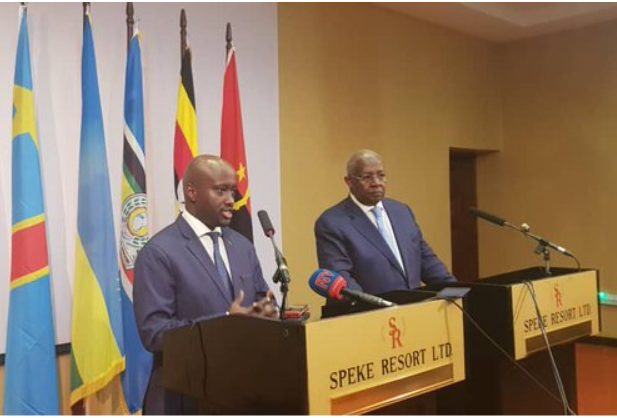One of the key issues raised by Rwanda as an area of concern as far as Uganda is concerned is that Uganda has been arresting innocent Rwandans, detaining them access to consular services. This is a matter that the government of Rwanda through various officials have accused Uganda of.
However, during the meeting between Ugandan and Rwandan officials last week, the delegation from Rwanda was challenged to produce names of their citizens that are allegedly detained in Uganda.
It should be remembered that Rwanda, in February, closed its border to goods from Uganda and its forces have all year endeavoured to keep imports from Uganda entering into Rwanda.
When the officials raised the matter of ‘innocent’ Rwandans detained in Uganda, Foreign Affairs Minister Sam Kutesa who led the Ugandan delegation challenged the Rwandan delegation to produce evidence so that the claims can be verified.
When Hon Kuteesa asked for that evidence for Uganda to verify them, facilitators especially one from Angola wasn’t willing to share, something that infuriated the Ugandan team.
“How can you accuse us of things you claim you have evidence about and you don’t want us to verify?” Hon Kutesa wondered.
Keen to make things easy for the Rwandan team, the Ugandan delegation asked Rwanda to be part of a joint verification committee to look into the allegations but they refused and said there is nothing to verify, insisting that all their claims were true.
After the Ugandan delegation pressed hard on the allegations, one facilitator from Angola said he had been given a report ‘full of evidence’ yet he admitted not to read it.
“I was given a booklet by Rwanda full of evidence against Uganda. I didn’t even read it as it was a lot, I put it on my desk,” said Angola’s Minister for External Relations Manuel Domingos Augusto.
The Ugandan delegation was left dumbfounded after the facilitators refused to share evidence against a party to the talks for them to respond to allegations.
The meeting that took place last Friday as Speke Resort Munyonyo followed a series of postponements of the second meeting of the joint Ad-hoc committee on the Luanda Memorandum of Understanding (MoU) in Kampala, at the request of Kigali.
The Rwandan team was led by the controversial minister in charge of the East African Community Olivier Nduhungirehe. He was accompanied by ministers Patrick Nyamvumba of Internal Affairs, Justice Minister Johnston Busingye and Prof Anastase Shyaka.
The meeting sought to normalize relations between the two countries which have been frosty since February this year when Rwanda closed the main border with Uganda at Katuna and accused Uganda of incarcerating and deporting her citizens and illegal detention of Rwandan nationals.
Uganda dismissed the allegations and said the judicial process was followed to deport some of the Rwandan citizens who were found engaged in criminal acts.
Some of the Rwandan Intelligence Agents arrested in Uganda are facing the General Court Martial for Abducting Rwandan Refugees and Asylum seekers from Uganda and illegally repatriating them back to Rwanda. A notorious one known as Rene Rutagungira is one of those whose case has not been concluded.
Minister Kutesa of Uganda explained to journalists after a closed-door meeting that: “One of the issues Uganda raised was infiltration of Ugandan security agencies by Rwanda government and its people. That issue has been discussed and will continue to be discussed, and that is the reason why people (Rwandans) have been arrested.”
Kutesa added that Uganda has no difficulty releasing those arrested, but added: “We must also discuss and end this issue of attempted infiltration of our agencies because that is the only cause.”
Responding to claims that Uganda is harbouring Rwandan dissidents, Mr Kutesa said: “Uganda will not try to subvert the government of Rwanda because there is no reason and no benefit and cause for such.”
Mr Kutesa said the best way to succeed in resolving the current impasse is having good faith and goodwill between the two sister countries.
He said the meeting proposed establishment of a joint verification mechanism where “both of us look at each other’s allegations and try to establish the truth. Because we think this will be the basis of goodwill.”
However, this proposal was rejected by the Rwandan delegation to the surprise of the Ugandan delegation.
Luanda agreement
It should be remembered that Presidents Yoweri Museveni and Paul Kagame signed a pact in July in Luanda, Angola, committing to regional cooperation and security.
Two months later, the first follow up meeting was held in Kigali where Rwanda was asked to prove their allegations by providing a list of Rwandans detained in Uganda before the second meeting in Kampala.
On her part, Uganda committed to verifying the information for the purpose of processing those named through the due judicial process and releasing those, if any, against whom evidence of criminal conduct was not found as claimed by Rwanda.
Why Rwanda Refused to Comply
Reports show that the initial postponement of the meeting was after Rwanda’s realisation that the arrested Rwandan elements possessed Ugandan Identity cards and so, bringing out their identities would be ‘suicidal’, subjecting them to a catch-22 situation.
“We were advised against releasing the list to Uganda as Uganda would simply produce the several IDs and documents our people (intelligence agents) used to execute several operations within the Uganda territory while passing off as Ugandans. This would confirm Uganda’s concerns about Rwanda,” a source told Soft Power news website.




